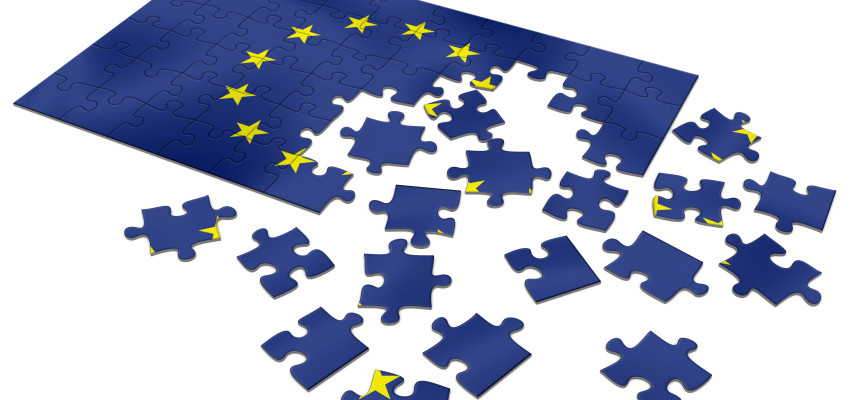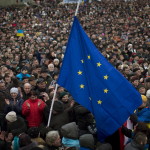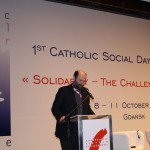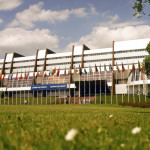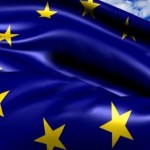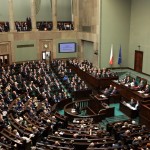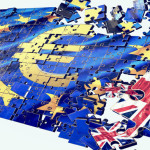2014 has been first of all an election year, the European elections, which took place from 22nd to 25th of May, 2014. The citizens of the 28 member countries of the EU have chosen the 751 MPs. But if they were the eighth European elections since the first vote by universal suffrage in 1979, for the first time the elections have a direct influence on the choice of the President of the European Commission. This was indeed elected by Parliament on the proposal of the European Council. As the European Popular Party has retained more members than the Socialists and Democrats, the Christian Social Jean-Claude Juncker, Luxembourg, has been appointed.
Another big change in the EU: a new President of the European Council and a new High Representative for Foreign Affairs. After two terms, Herman Van Rompuy has been replaced at the presidency of the Council by former Polish Prime Minister Donald Tusk appointed at the summit of the European Council in Brussels. He took office on December 1st. A symbolic choice, because if the first President was from one of the founding countries of the EU, the second President, from a nation of the former “Eastern Bloc” symbolizes the reunification started there 25 years after the fall of the Berlin Wall. On the other hand, the British Catherine Ashton has been replaced by Italian Federica Mogherini, previously Foreign Minister in the Italian government.
Fight against unemployment: the composition of the new Commission was submitted to the recurrent fire of questions from MPs. Some candidates were actually threatened, including that of the Spaniard Miguel Arias Canete who inherited the responsibility of energy but was criticized for his ties with the oil industry; or that of the French Pierre Moscovici to the economic affairs, and therefore appointed to manage the budgetary discipline when his country, France, has gone far from it.
MPs were mostly waiting for the outline of the programme of the new Commission. From the start, Jean-Claude Juncker has put social Europe at the center of it. “We must respond to the anxieties, the fears and hopes of European citizens by dream,” he launched in the preamble. For him, “the social must be also at the heart of European action”. A priority that can only be welcomed when we know that with almost 25.7 million unemployed, the unemployment rate in the EU rose to 10.5% in March 2014. For the new President, the conclusion is clear: “A twenty-ninth state is being built in the EU, that of the unemployed”. A situation that induces an increase in poverty and social divide.
To reverse the trend, Juncker promised to raise 300 billion euros to be invested in the economy in the next three years to re-industrialise Europe. To cite its major projects: infrastructure in the areas of energy, transports, digital economy. The new President of the Commission has also promised to fight against fraud and tax evasion, and against social dumping. He has assured that he would change the approval process of the farming of GMO, and that he would not accept a free trade agreement with the United States concluded that “at any price”.
In short, the ideas are there. Titanic projects, in particular in terms of employment, poverty and immigration. The new Commission does not have much room to maneuver, especially since several Member States are always in serious economic difficulties. And it is them who finance the European Union!
Il 2014 è stato innanzitutto l’anno delle elezioni europee, svoltesi dal 22 al 25 maggio 2014. I cittadini dei 28 Paesi membri dell’Unione hanno scelto i 751 deputati del Parlamento europeo. Ma, anche se si trattava dell’ottavo scrutinio europeo dal primo voto a suffragio universale diretto del 1979, per la prima volta queste elezioni hanno avuto un’influenza diretta sulla scelta del presidente della Commissione europea. Questi, infatti, è stato eletto dal Parlamento su proposta del Consiglio europeo. Avendo il partito popolare europeo mantenuto più deputati del gruppo dei socialisti e dei democratici, è stato il cristiano sociale lussemburghese Jean-Claude Juncker a essere nominato.
Altro cambiamento importante nell’Unione: un nuovo presidente del Consiglio europeo e un nuovo alto rappresentante per gli affari esteri. Dopo due mandati, il belga Herman Van Rompuy è stato rimpiazzato alla presidenza del Consiglio dall’ex primo ministro polacco Donald Tusk, eletto nel corso del summit del Consiglio europeo di Bruxelles. Tusk ha assunto l’incarico il 1° dicembre 2014. Una scelta simbolica, perché se Rompuy era originario di uno dei paesi fondatori dell’Ue, il suo successore, Tusk, proveniente da una delle nazioni del vecchio “blocco dell’Est”, simboleggia la riunificazione iniziata 25 anni fa, dopo la caduta del muro di Berlino. Inoltre, la britannica Catherine Ashton è stata sostituita dall’italiana Federica Mogherini, già ministro degli affari esteri italiano.
Lottare contro la disoccupazione:La composizione della nuova Commissione è stata sottomessa al fuoco vivo delle domande dei parlamentari. Alcuni candidati erano effettivamente minacciati, specialmente lo spagnolo Miguel Arias Canete che ha ereditato il settore energetico ma al quale si rimproverano dei legami con l’industria petrolifera; o ancora il francese Pierre Moscovici agli affari economici, e dunque chiamato a gestire la disciplina fiscale quando il suo Paese, la Francia, se ne è allontanato.
I deputati europei aspettavano soprattutto le grandi linee del programma della nuova commissione. Per prima cosa, Jean-Claude Juncker ha messo l’Europa sociale al centro del programma. “Dobbiamo rispondere alle angosce, alle paure e alle speranze dei cittadini europei e ai loro sogni”, ha esordito. Per lui, “anche il sociale deve essere al centro dell’azione europea”. Una priorità da accogliere favorevolmente, sapendo che con quasi 25,7 milioni di persone senza lavoro, il tasso di disoccupazione nell’Unione europea è salito al 10,5% a marzo 2014. Per il nuovo presidente, la constatazione è evidente: “Un ventinovesimo stato si costituisce nell’Ue, quello dei senza lavoro”. Una situazione che porta a un aumento della povertà e della frattura sociale.
Per invertire la tendenza, Juncker ha promesso di mobilitare 300 miliardi di euro da investire nei prossimi tre anni nell’economia, al fine di re-industrializzare l’Europa. E di rilanciare i suoi grandi cantieri: l’infrastruttura nel settore dell’energia, dei trasporti e dell’economia digitale. Il nuovo presidente della Commissione ha inoltre promesso di lottare contro la frode e l’evasione fiscale, e contro il dumping sociale. Juncker ha inoltre assicurato che modificherà il processo di autorizzazione di colture degli Ogm e che non accetterà un accordo di libero scambio con gli Stati Uniti firmato “a qualsiasi prezzo”.
Dunque, le idee ci sono. I cantieri sono titanici, soprattutto in materia di lavoro, di povertà e d’immigrazione. La nuova Commissione non ha un grande margine d manovra, tanto più che molti stati membri sono ancora in difficoltà economiche importanti. E sono loro che finanziano l’Unione europea!
Les idées sont là
2014 a d’abord été une année d’élections, européennes, lesquelles ont eu lieu du 22 au 25 mai 2014. Les citoyens des 28 pays membres de l’Union ont choisi les 751 députés du Parlement européen. Mais, s’il s’agissait du huitième scrutin européen depuis le premier vote au suffrage universel direct en 1979, pour la première fois, ces élections ont une influence directe sur le choix du président de la Commission européenne. Celui-ci a en effet été élu par le Parlement sur proposition du Conseil européen. Le Parti populaire européen ayant conservé plus de députés que le groupe des socialistes et démocrates, c’est le social-chrétien luxembourgeois Jean-Claude Juncker qui a été désigné.
Autre changement de taille dans l’Union : un nouveau Président du Conseil européen et une nouvelle Haute représentante pour les Affaires étrangères. Après deux mandats, le Belge Herman Van Rompuy a été remplacé à la présidence du Conseil par l’ancien Premier ministre polonais Donald Tusk, désigné lors du sommet du Conseil européen de Bruxelles. Il a pris ses fonctions le 1er décembre. Un choix symbolique car si le premier Président était originaire d’un des pays fondateurs de l’Ue, le deuxième président, issu d’une nation de l’ancien “bloc de l’Est”, symbolise la réunification entamée il y a 25 ans, après la chute du Mur de Berlin. D’autre part, la britannique Catherine Ashton a été remplacée par l’Italienne Federica Mogherini, auparavant ministre des Affaires étrangères dans le gouvernement italien.
Lutter contre le chômage: la composition de la nouvelle Commission a été soumise au feu récurrent des questions des parlementaires. Certains candidats étaient réellement menacés, notamment celle de l’Espagnol Miguel Arias Canete qui a hérité de la compétence de l’énergie mais auquel on reprochait ses liens avec l’industrie pétrolière ; ou encore celle du Français Pierre Moscovici aux affaires économiques, et donc appelé à gérer la discipline budgétaire alors que son pays la France s’en est éloigné.
Les députés européens attendaient surtout les grandes lignes du programme de la nouvelle commission. D’emblée, Jean-Claude Juncker a mis l’Europe sociale au centre de celui-ci. “Nous devons répondre aux angoisses, aux peurs et aux espoirs des citoyens européens par le rêve”, a-t-il lancé en préambule. Pour lui, “le social doit être aussi au cœur de l’action européenne”. Une priorité qu’on ne peut que saluer lorsqu’on sait qu’avec près de 25,7 millions de personnes sans emploi, le taux de chômage dans l’Union européenne s’est élevé à 10,5% en mars 2014. Pour le nouveau président, le constat est évident : “Un vingt-neuvième État se construit dans l’UE, celui des sans-emplois”. Une situation qui induit un accroissement de la pauvreté et de la fracture sociale.
Pour inverser la tendance, M. Juncker a promis mobiliser 300 milliards d’euros pour investir dans l’économie dans les trois prochaines années, afin de réindustrialiser l’Europe. Et de citer ses grands chantiers : l’infrastructure dans les secteurs de l’énergie, des transports, de l’économie digitale. Le nouveau président de la commission a aussi promis de lutter contre la fraude et l’évasion fiscales, et contre le dumping social. Il a assuré qu’il allait modifier le processus d’autorisation de culture des OGM et qu’il n’accepterait pas un accord de libre-échange avec les Etats-Unis conclu “à n’importe quel prix”.
Bref, les idées sont là. Les chantiers titanesques, notamment en matière d’emploi, de pauvreté et d’immigration. La nouvelle Commission n’a pas une grande marge de manœuvre, d’autant que plusieurs Etats membres sont toujours dans des difficultés économiques importantes. Et ce sont eux qui financent l’Union européenne !
Jean-Jacques Durré
Direttore Media cattolici francofoni (Belgio); Coordinatore delle radio RCF
Latest posts by Jean-Jacques Durré (see all)
- The ideas are there - 2 gennaio 2015
- The Berlin wall: the courage of Eastern christians - 9 novembre 2014
- What choices for the European Union? - 18 giugno 2014

